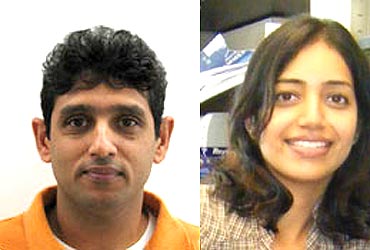 Three Indian scientists were part of the 24-member team that developed the first synthetic bacterial genome.
Three Indian scientists were part of the 24-member team that developed the first synthetic bacterial genome.
The three researchers of Indian-origin were Sanjay Vashee, Radha Krishnakumar and Prashanth P Parmar, who were part of the team led by Craig Venter.
In a scientific breakthrough, Venter's team have created artificial life by developing the first bacteria cell controlled by a synthetic genome after 15 years of toil.
In the third meeting of Hastings Center workshop examining moral issues in synthetic biology, the J Craig Venter Group announced the creation of the first synthetic bacterial genome.
"This is the first synthetic cell that's been made," said lead researcher Craig Venter.
The cell was created from a synthetic chromosome, made with four bottles of chemicals on a chemical synthesiser, starting with information in a computer, said the researchers.
The Hastings Center has been at the forefront of interdisciplinary research into ethical issues in emerging technology.
The new life form, called 'Synthia', can pave new remedies in healthcare and and in producing biofuels, said the Daily Mail
The researchers spent 15 years and spent £27.7million to achieve the breakthrough.
However there have also been fears that the discovery has opened many risks -- the research, which has been detailed in the journal Science, could be abused to create the ultimate biological weapon and also any mistake could lead to millions being wiped out by a plague, like in the scenes of the Will Smith film I Am Legend, the UK daily said.
Project participants include synthetic biologists, bioethicists, philosophers, and public policy experts.
"Synthetic biology certainly raises deep philosophical and moral questions about the human relationship to nature," said Gregory Kaebnick, a Hastings Center scholar who is managing the project.
"It's not clear what the answers to those questions are. If by 'nature' we mean the world around us, more or less as we found it, we may well decide that synthetic biology does not really change the human relationship to natureand may even help us preserve what is left of it," he added.
Nor is it clear that the questions raised by synthetic biology are new ones.
"We have come up against similar problems in other domains -- most notably, in work on nanotechnology and gene transfer technology -- but synthetic biology poses them especially sharply and pressingly," said Thomas H Murray, president of The Hastings Center and the project's principal investigator.
Inputs from agencies
Image: (Left) Sanjay Vashee and Radha Krishnakumar






 © 2025
© 2025